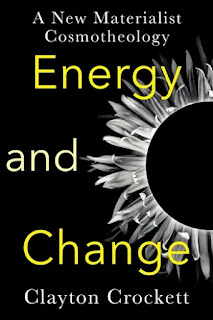 (2011) and Deleuze Beyond Badiou: Ontology, Multiplicity, and Event (2013) and coauthor of An Insurrectionist Manifesto: Four New Gospels for a Radical Politics (2016). He is also a coeditor of the series Insurrections: Critical Studies in Religion, Politics, and Culture.
(2011) and Deleuze Beyond Badiou: Ontology, Multiplicity, and Event (2013) and coauthor of An Insurrectionist Manifesto: Four New Gospels for a Radical Politics (2016). He is also a coeditor of the series Insurrections: Critical Studies in Religion, Politics, and Culture.
Crockett applied the Page 99 Test to his new book, Energy and Change: A New Materialist Cosmotheology, and reported the following:
Page 99 of this book talks about the role of bacteria in biological evolution, and how that has been overlooked and under-appreciated. Specifically, bacteria reproduce asexually and practice horizontal gene transfer, which is different from sexual reproduction that passes down genes by means of natural selection. The evolutionary biologist Stephen Jay Gould says that bacteria and another closely related kingdom, Archaea, have been, are, and likely will remain “the dominant creatures on earth by any standard evolutionary criterion of biochemical diversity.” This understanding works against the teleological narrative of evolution that assumes that large multicellular animals are the most complex and significant forms of life on earth.Learn more about Energy and Change at the Columbia University Press website.
In my evaluation, this test of page 99 does not give a very good sense of the book as a whole. It occurs within a chapter that focuses on bioenergetics and life, and considers how all living organisms function by means of energy transformation. Here I discuss bacteria and archaea, which are single-celled prokaryotes, but the overall point is to see how it is the almost inconceivable symbiotic union of these two life forms that produces the first eukaryote, or cell with a nucleus that can then assemble and link up with other cells to form multicellular organisms. The bacteria that is assimilated into an archaea eventually becomes the mitochondria, which produces energy by pushing a proton across a membrane to create the chemical ATP. This is how cells generate energy for all forms of complex life.
The book as a whole develops a comprehensive philosophy of energy, and looks at being as energy transformation across multiple thresholds, including thermodynamics, biology, economics, ecology, and religion. Page 99 is from Chapter 2, which concerns how energy flow through an organic system organizes and sustains a living system. Life is an entirely new form, but it does not manifest a totally different kind of energy. Energy is already self-organizing in thermodynamic forms that occur in open systems that do not operate at equilibrium.
We do not know what energy is; energy is how we measure change, and change is what is really real about our world, because it is constantly changing. In ecological terms, we are running out of useful forms of energy that are non-renewable in human time scales, which is a form of entropy. Entropy does not necessarily lead to disorder, but we need new ways of thinking about energy in terms of global capitalism and what is called the Anthropocene. Energy also gives us new ways to think about spirit, in ways that are not dualistically opposed to matter, in Amerindian, Vodou, and Chinese traditions. Finally, we can adopt the perspective of radical theology to think about God as the ultimate reality of Change, and then energy becomes an affirmation, a kind of love.
--Marshal Zeringue



